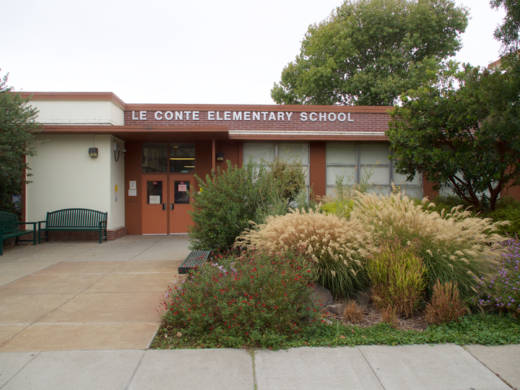“It’s clear Joseph LeConte was an outspoken white supremacist who likely would not have been in favor of educating many of the students — the majority of students — that walk the halls of our school, simply because they’re children of color,” said PTA president Leah Martens at the meeting.
School Board members also spoke passionately about their belief that LeConte was not an appropriate namesake for a school. The elementary school is in the process of becoming the district’s fully bilingual immersion campus, and parents and board members said the name was especially unreflective of the school’s new identity.
Board member Josh Daniels, a Berkeley native, said it is important to reckon with past decisions.
“It’s really interesting to learn about the history and the place I’ve called home my whole life, and for many reasons I’m very proud of, but also to not try to hide from the fact that there was redlining in Berkeley, for example," he said. "We, like the rest of this country, have a history we cannot ignore and should not always be proud of.”
Board president Ty Alper read from passages of LeConte’s writings he had found to be egregious, as well as from an email sent to him Wednesday by a woman whose ancestors were enslaved on LeConte’s plantation. She wrote that she has documentation showing LeConte bought her relatives for $25-$500, and that his botanical garden in Georgia was built with their free labor.
“It has made me sick to my stomach to see his name on schools,” she wrote in the email Alper read aloud.
Nobody at the board meeting spoke in favor of maintaining the name, but some neighbors expressed their frustration with the process that led up to the vote. Some said that despite what the district has said, they were not notified about a community meeting on the issue that was held in October.
The board’s fairly new policy on renaming facilities does not require the district to involve the community outside of the school walls in the de-naming effort — which is a mistake, said Mark Coplan, former BUSD spokesman and LeConte neighbor. He said at the board meeting that he pleaded with the board to include mandatory input from neighbors in the policy when it was being drafted.
“Please let’s have a community process,” said Gianna Ranuzzi, president of the LeConte Neighborhood Association. “This is a very good educational opportunity. … I don’t see why we can’t wait.”
“I respectfully disagree with the assertion that the neighbors have an equal stake with the students, staff and families” of a school, Daniels said in response. If there were physical changes to the facility that affected neighboring households, that would be a different story, he said.
Board member Judy Appel said the district could do a better job of including the neighbors in the selection of a new name, as schools are “part of the fabric” of a neighborhood.
“This is a lesson that we need to make sure to really include the neighborhood in the recommendations that are going to come to this board for renaming the school,” she said. The board’s policy on renaming a school requires three community meetings.
In other forums, some residents have said they are concerned the name change will begin a trend wherein the many complex and problematic namesakes of institutions in Berkeley will all be questioned, leading to the methodic erasure of history. Columbus Elementary was already renamed Rosa Parks Elementary in 2000.
Board members said they think all de-naming proposals should be considered with skepticism and on their individual merits. The board policy prevents multiple renaming efforts from occurring simultaneously and calls for a review of the effectiveness of the policy before a new effort is initiated.
“We’ve built into this process a sort of moratorium,” Alper said at the meeting.
But, he said of the LeConte decision, “this was an easy case.”
